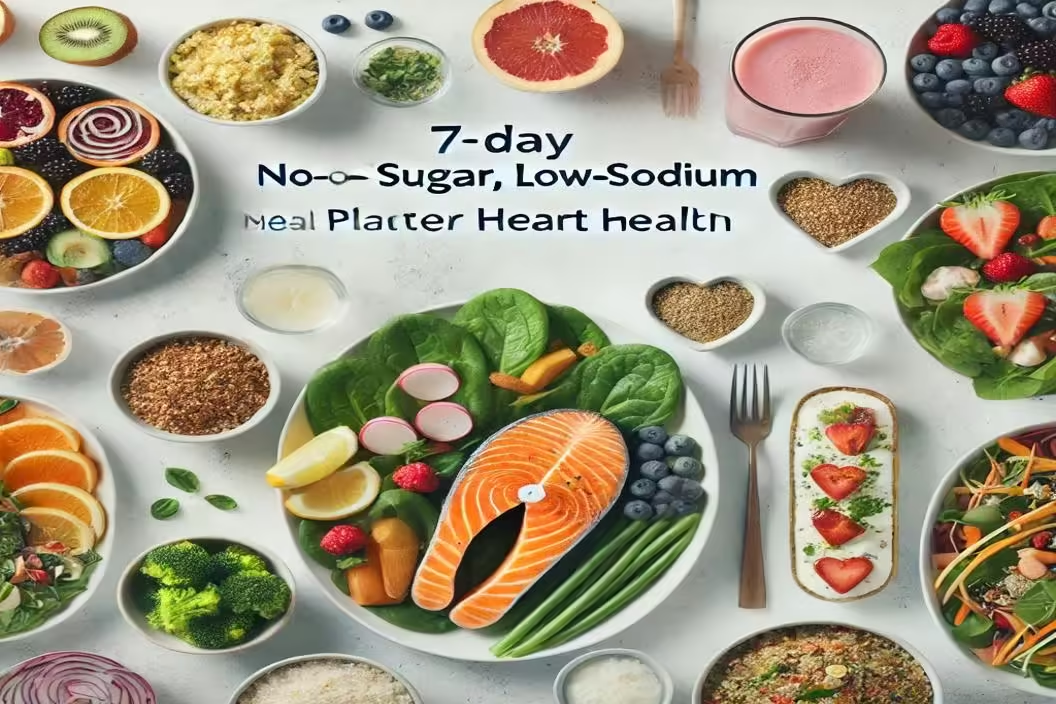Table of Contents
7-Day No-Sugar, Low-Sodium Meal Plan for Better Heart Health, Created by a Dietitian
Maintaining heart health is crucial for overall well-being, and diet plays a significant role in achieving this goal. A heart-healthy diet can help reduce the risk of cardiovascular diseases, lower blood pressure, and improve cholesterol levels. To help you get started, we’ve created a 7-day no-sugar, low-sodium meal plan, designed by a dietitian, to support better heart health.
Why No-Sugar and Low-Sodium?
Excessive sugar and sodium intake are major contributors to poor heart health. High sugar consumption can lead to weight gain, diabetes, and increased risk of heart disease. On the other hand, too much sodium can elevate blood pressure, leading to hypertension and heart problems. By eliminating added sugars and reducing sodium, you can take significant steps toward improving your cardiovascular health.
7-Day No-Sugar, Low-Sodium Meal Plan
Day 1
Breakfast:
- Greek yogurt with fresh berries and a sprinkle of chia seeds
Lunch:
- Quinoa salad with mixed greens, cherry tomatoes, cucumber, and lemon-tahini dressing
Snack:
- Sliced apple with almond butter
Dinner:
- Baked salmon with steamed broccoli and brown rice
Day 2
Breakfast:
- Oatmeal topped with sliced banana and a handful of walnuts
Lunch:
- Lentil soup with a side of mixed green salad
Snack:
- Carrot sticks with hummus
Dinner:
- Grilled chicken breast with quinoa and roasted Brussels sprouts
Day 3
Breakfast:
- Smoothie made with spinach, avocado, unsweetened almond milk, and a scoop of protein powder
Lunch:
- Chickpea and vegetable stir-fry with brown rice
Snack:
- Celery sticks with cottage cheese
Dinner:
- Turkey meatballs with zucchini noodles and marinara sauce (low sodium)
Day 4
Breakfast:
- Scrambled eggs with spinach and a slice of whole-grain toast
Lunch:
- Black bean and avocado wrap with whole-grain tortilla
Snack:
- Unsalted mixed nuts
Dinner:
- Baked cod with sweet potato and steamed asparagus
Day 5
Breakfast:
- Chia seed pudding made with unsweetened coconut milk and topped with fresh berries
Lunch:
- Mixed vegetable and tofu stir-fry with quinoa
Snack:
- Sliced cucumber with guacamole
Dinner:
- Grilled shrimp with cauliflower rice and sautéed green beans
Day 6
Breakfast:
- Whole-grain toast with mashed avocado and a poached egg
Lunch:
- Spinach and lentil salad with a lemon vinaigrette
Snack:
- Fresh peach or nectarine
Dinner:
- Chicken and vegetable kebabs with a side of wild rice
Day 7
Breakfast:
- Smoothie bowl with unsweetened acai, fresh berries, and a sprinkle of granola
Lunch:
- Quinoa and black bean salad with bell peppers and cilantro lime dressing
Snack:
- Bell pepper strips with hummus
Dinner:
- Baked chicken thighs with roasted butternut squash and steamed kale
Tips for Success
- Read Labels: Always check food labels for hidden sugars and sodium. Look for items labeled “no added sugars” and “low sodium.”
- Cook at Home: Preparing your meals allows you to control the ingredients and avoid added sugars and excessive salt found in restaurant meals.
- Stay Hydrated: Drink plenty of water throughout the day to support overall health and help manage hunger.
- Plan Ahead: Prepare meals and snacks in advance to ensure you stick to your no-sugar, low-sodium plan.
- Spice it Up: Use herbs and spices to add flavor to your meals without relying on salt.
Benefits of a No-Sugar, Low-Sodium Diet
- Lower Blood Pressure: Reducing sodium intake helps manage blood pressure levels, lowering the risk of hypertension.
- Better Weight Management: Cutting out added sugars can help reduce calorie intake and promote healthy weight loss.
- Improved Cholesterol Levels: A heart-healthy diet can improve cholesterol profiles, reducing bad LDL cholesterol and increasing good HDL cholesterol.
- Reduced Risk of Heart Disease: Overall, following a no-sugar, low-sodium diet supports cardiovascular health and lowers the risk of heart disease.
By following this 7-day meal plan, you can take a proactive step towards better heart health. Remember, consistency is key, and making small, sustainable changes to your diet can have a significant impact on your long-term health.
For more delicious and heart-healthy recipes, visit Eating Well.
More blogs: https://sleepingsirens.com

